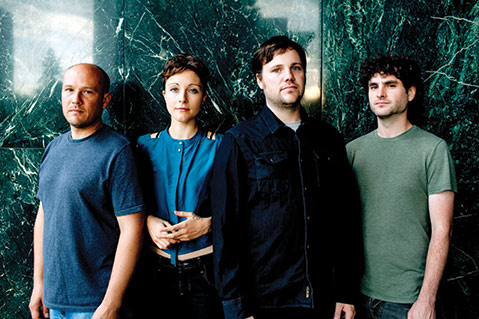Navigating Poliça’s Electronic Wonderland
Minneapolis Synth Rockers Play SOhO on October 15

There’s something eerily chilling about the music Poliça makes, and nowhere is that more apparent than on the band’s latest album, Shulamith. Like its 2012 predecessor, the record is pushed along by a swirling combination of synths, percussion, and guitars. Together, these layers act as the pedestal for frontwoman Channy Leaneagh’s billowing vocals, which come drenched in both reverb and Auto-Tune. The move seems to be made almost in spite of Leaneagh’s raw capabilities, and in turn, that spitefulness seems to drive most of the songs on Shulamith’s track list.
These qualities seem all the more fitting when you learn that Poliça hails from Minneapolis, Minnesota, a city known almost as much for its thriving art community as it is for its bone-chilling winters. For those familiar with the scene, you’ll recognize much of Poliça’s lineup, which features Gayngs member Ryan Olson, as well as Twin Cities percussionists Drew Christopherson and Ben Ivascu, who together deliver one of the more spectacular dual-drummer setups currently making the rounds.
This Wednesday, Poliça injects its icy brand of Midwest cool on SOhO Restaurant & Music Club. In anticipation, I exchanged some questions with Leaneagh via email.
You guys are working with a lot of layers. Where do the songs start? They often start in Ryan’s mind. He puts the foundation together, and the rest of us react to that.
How did the writing/recording process for Shulamith compare to what you guys had done before? Were there any major shakeups in the way you work? No major shakeups really. The major challenge was the Jekyll & Hyde lifestyle we’ve had as touring musicians and how that relates to settling into studio time. But we’re all pretty anxious to make more music together.
How/when did you settle on calling the record Shulamith? I had read the book Dialectic of Sex by Shulamith Firestone, and I wanted to remember that book and the women who wrote it in the form of our record.
I was talking to someone recently about the struggle of working within the electronic medium after coming up in a more live rock setting — specifically, the idea that a lot of music-making programs are made to essentially take the legwork out of the creative process. That’s interesting. I came from a classical background as a violin player. My first couple of bands had no electronic elements, so I found electronic music more of a struggle. But in general, being in a band has been approached very similarly in every project I’ve been a member of (except Gayngs, maybe). Everyone has their roles and it operates as a cooperative that is working to create a cohesive whole among all of our voices/instruments/strengths, whether in electronic or non-electronic instrumentation.
What makes your music yours when everyone has access to the same tools? The heart of each musician is the personality of their soul—the soul of their songs. Every musician has their own unique set of tools if they use them.
I read somewhere that the band name was the result of a computer glitch. What were some of the other names you tossed around before landing on Poliça? Michelle Megadance, Battles …. There were hundreds of ideas, but I’ve forgotten them all by now.
You guys have had a lot of adjectives and genres tossed at you. How do you describe the music you’re making to someone who’s never heard it? I start with what we’re working with: two of the most amazing drummers ever, one of the most amazing bass players ever, electronic pads of passion and conflict, and me singing over all that. It’s something like that.
What tags are you least comfortable with? Trip-hop.
I want to know a bit about Minneapolis. Do you feel like the city (and the weather) is pretty conducive to art-making? I think so. It’s all I know really, but it seems like everyone between 16 and 80 years old is in a band. It’s a real music-making town.
Looking back on Poliça’s body of work, do you feel like the city has had an impact on your sound? Yes, definitely. All the bands we have individually played with in Minneapolis and the Minneapolis bands we admire have influenced us all. We all have played with Marijuana Deathsquads, and that along with Gayngs are probably the two bands that have influenced our sound the most.
What’s one song you wish you had written? The first song that popped in my head is “Climax” by Usher.
If you could sit down and write a record with anyone, living or dead, who would it be? I am so excited to write more songs with Poliça, so I’m gonna say Ryan Olson. I love writing music with him, and it is the best feeling in the world when the two of us get a song together.
4·1·1
Poliça plays SOhO Restaurant & Music Club (1221 State St.) on Wednesday, October 15, at 9 p.m. Call (805) 962-7776 or visit clubmercy.com for tickets and info.



